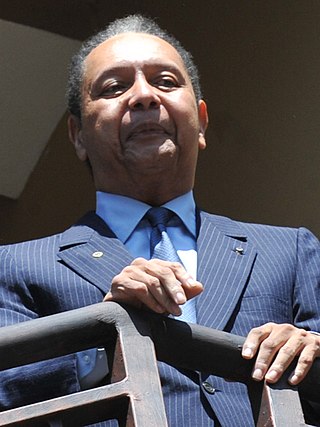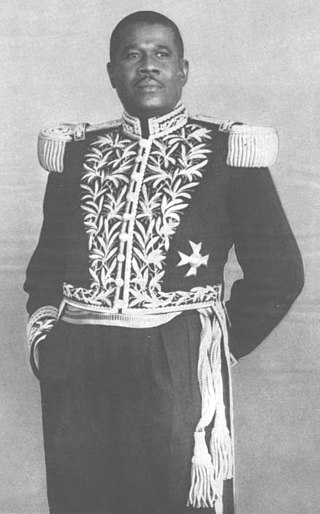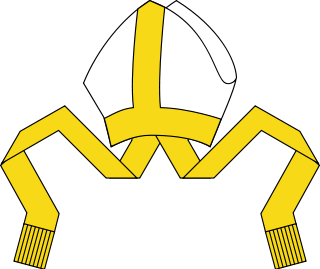Related Research Articles

François Duvalier, also known as Papa Doc, was a Haitian politician who served as the president of Haiti from 1957 until his death in 1971. He was elected president in the 1957 general election on a populist and black nationalist platform. After thwarting a military coup d'état in 1958, his regime rapidly became more autocratic and despotic. An undercover government death squad, the Tonton Macoute, indiscriminately tortured or killed Duvalier's opponents; the Tonton Macoute was thought to be so pervasive that Haitians became highly fearful of expressing any form of dissent, even in private. Duvalier further sought to solidify his rule by incorporating elements of Haitian mythology into a personality cult.

The government of Haiti is a semi-presidential republic, a multi-party system wherein the President of Haiti is head of state elected directly by popular elections. The Prime Minister acts as head of government and is appointed by the President, chosen from the majority party in the National Assembly. Executive power is exercised by the President and Prime Minister who together constitute the government. Legislative power is vested in both the government and the two chambers of the National Assembly of Haiti. The government is organized unitarily, thus the central government delegates powers to the departments without a constitutional need for consent. The current structure of Haiti's political system was set forth in the Constitution of March 29, 1987.

Jean-Claude Duvalier, nicknamed "Baby Doc", was a Haitian politician who was the President of Haiti from 1971 until he was overthrown by a popular uprising in February 1986. He succeeded his father François "Papa Doc" Duvalier as the ruler of Haiti after his death in 1971. After assuming power, he introduced cosmetic changes to his father's regime and delegated much authority to his advisors. Thousands of Haitians were killed or tortured, and hundreds of thousands fled the country during his presidency. He maintained a notoriously lavish lifestyle while poverty among his people remained the most widespread of any country in the Western Hemisphere.

Matthieu Prosper Avril is a Haitian political figure who was President of Haiti from 1988 to 1990. A trusted member of François Duvalier's Presidential Guard and adviser to Jean-Claude Duvalier, Lt. Gen. Avril led the September 1988 Haitian coup d'état against a transition military government installed after Jean-Claude Duvalier's 1986 overthrow. He was President until March 1990, in a period which according to Amnesty International was "marred by serious human rights violations". He was arrested in 2001, but released in March 2004 after the 2004 Haitian coup d'état overthrew Jean-Bertrand Aristide.

Paul Eugène Magloire, nicknamed Kanson Fè, was the Haitian president from 1950 to 1956.
Gérard Jean-Juste was a Roman Catholic priest and rector of Saint Claire's church for the poor in Port-au-Prince, Haiti. He was also a liberation theologian and a supporter of the Fanmi Lavalas political party, as well as heading the Miami, Florida-based Haitian Refugee Center from 1977 to 1990.
Paul Arcelin is a Haitian who lived in Canada for many years in exile from the Duvalier dictatorship because of his political activities. He married a Canadian woman with whom he raised two children in Montréal.
Jean-Claude Bajeux was a Haitian political activist and professor of Caribbean literature. For many years he was director of the Ecumenical Center for Human Rights based in Haiti's capital, Port-au-Prince, and a leader of the National Congress of Democratic Movements, a moderate socialist political party also known as KONAKOM. He was Minister of Culture during Jean-Bertrand Aristide's first term as President of Haiti.

Ertha Pascal-Trouillot is a Haitian politician who served as the provisional President of Haiti for 11 months in 1990 and 1991. She was the first woman in Haitian history to hold that office and the first female president of African descent in the Americas.

The Archdiocese of Miami is a Latin Church archdiocese of the Catholic Church in South Florida in the United States. It is the metropolitan see for the Ecclesiastical Province of Miami, which covers all of Florida.

Michel Joseph Martelly is a Haitian musician and politician who was the President of Haiti from May 2011 until February 2016.

Joseph Emmanuel "Manno" Charlemagne was a Haitian political folk singer, songwriter and acoustic guitarist, political activist and politician. He recorded his political chansons in both French and in Creole. He lived abroad in exile twice, both during the 1980s and again during the years 1991–1994, when the country was ruled by a military junta led by Raoul Cédras.

Haiti has a sizeable diaspora, present primarily in the United States, Panama, Dominican Republic, Cuba, Canada, France, the Bahamas, Peru, Ecuador, Colombia, Brazil and Chile. They also live in other countries like Costa Rica, Mexico, Bolivia, Guatemala, Nicaragua, Honduras, Venezuela, Argentina, Barbados, Guyana, Belgium, Switzerland, Turks and Caicos, among others.

Guy A. Sansaricq was a Haitian-American prelate of the Catholic Church who served as auxiliary bishop of the Diocese of Brooklyn in New York from 2006 to 2010. He headed the Office of the Pastoral Care of Migrants and Refugees of the U.S. Conference of Catholic Bishops from 1988 to 2021.
Max Gesner Beauvoir was a Haitian biochemist and houngan. Beauvoir held one of the highest titles of Voudou priesthood, Ati or "Supreme Serviteur", a title given to Houngans and Mambos who have a great and very deep knowledge of the religion, and status within the religion. As Supreme Serviteur, Max was seen as a high authority within Vodou.

The 1991 Haitian coup d'état took place on 29 September 1991, when President Jean-Bertrand Aristide, elected eight months earlier in the 1990–91 Haitian general election, was deposed by the Armed Forces of Haiti. Haitian military officers, primarily Army General Raoul Cédras, Army Chief of Staff Philippe Biamby and Chief of the National Police, Michel François led the coup. Aristide was sent into exile, his life only saved by the intervention of US, French and Venezuelan diplomats. Aristide would later return to power in 1994.
Viter Juste was a Haitian-born American community leader, businessman, and activist. Juste coined the name, "Little Haiti," for the neighborhood in Miami, Florida which is a center of the Haitian-American community in Florida. He is considered the father of the Haitian American community in Miami.
Antoine Adrien was a Catholic Priest and liberation theology advocate who served as Father Superior of the Holy Ghost Order in Haiti. He also served as Director of the "Petit Séminaire Collège Saint-Martial", attended primarily by children of the country's elite. Adrien was expelled from Haiti in 1969 by the Francois Duvalier regime which accused the Holy Ghost Order of harboring communists working to overthrow the regime.

Bernard Fils-Aimé was a Haitian entrepreneur and activist. He was part of community assistance organizations for Haitians in America, cofounding the Haitian Refugee Center and serving on the board of the Haitian Education & Leadership Program. He also served as the managing director of Comcel Haiti from its founding in 1998 until its sale to Digicel in 2012.
Raymond Cassagnol was a Haitian Air Force officer/flight instructor, alleged Haitian rebel leader, and one of the first Haitian Tuskegee Airmen, "Red Tails," or “Schwartze Vogelmenschen” or among enemy German pilots. Cassagnol was an aviation classmate and roommate of Daniel James Jr., the first-ever African American four-star general.
References
- 1 2 3 4 5 Collins, Lois (January 14, 2010). "Haitians in Utah Work Phones". Deseret News . Archived from the original on January 22, 2024.
- ↑ "Urbane Haitian Envoy Seems Calm, But Generates Sparks". Miami Herald . April 15, 1984. pp. 26A.
- ↑ "Haitian Consul Apparently Ousted From Post". Miami Herald . February 19, 1986.